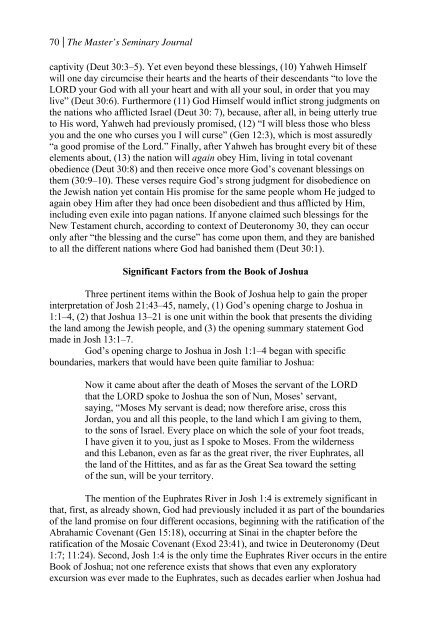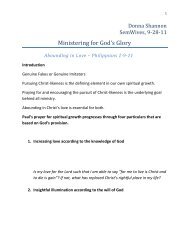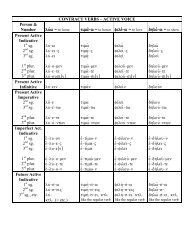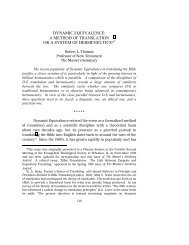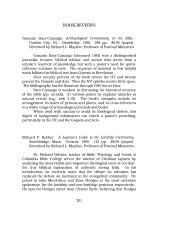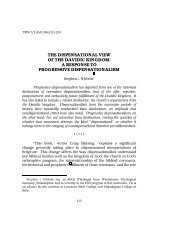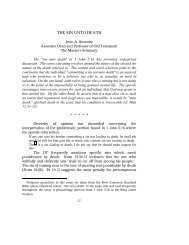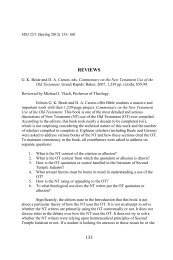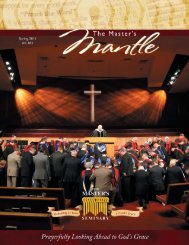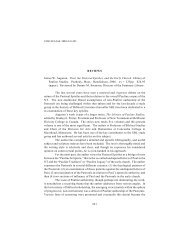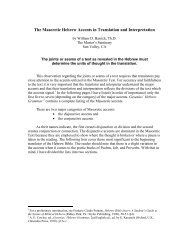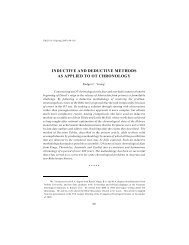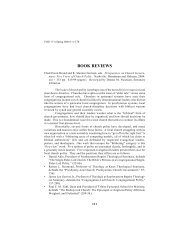Did God Fulfill Every Good Promise? - The Master's Seminary
Did God Fulfill Every Good Promise? - The Master's Seminary
Did God Fulfill Every Good Promise? - The Master's Seminary
You also want an ePaper? Increase the reach of your titles
YUMPU automatically turns print PDFs into web optimized ePapers that Google loves.
70 | <strong>The</strong> Master’s <strong>Seminary</strong> Journalcaptivity (Deut 30:3–5). Yet even beyond these blessings, (10) Yahweh Himselfwill one day circumcise their hearts and the hearts of their descendants “to love theLORD your <strong>God</strong> with all your heart and with all your soul, in order that you maylive” (Deut 30:6). Furthermore (11) <strong>God</strong> Himself would inflict strong judgments onthe nations who afflicted Israel (Deut 30: 7), because, after all, in being utterly trueto His word, Yahweh had previously promised, (12) “I will bless those who blessyou and the one who curses you I will curse” (Gen 12:3), which is most assuredly“a good promise of the Lord.” Finally, after Yahweh has brought every bit of theseelements about, (13) the nation will again obey Him, living in total covenantobedience (Deut 30:8) and then receive once more <strong>God</strong>’s covenant blessings onthem (30:9–10). <strong>The</strong>se verses require <strong>God</strong>’s strong judgment for disobedience onthe Jewish nation yet contain His promise for the same people whom He judged toagain obey Him after they had once been disobedient and thus afflicted by Him,including even exile into pagan nations. If anyone claimed such blessings for theNew Testament church, according to context of Deuteronomy 30, they can occuronly after “the blessing and the curse” has come upon them, and they are banishedto all the different nations where <strong>God</strong> had banished them (Deut 30:1).Significant Factors from the Book of JoshuaThree pertinent items within the Book of Joshua help to gain the properinterpretation of Josh 21:43–45, namely, (1) <strong>God</strong>’s opening charge to Joshua in1:1–4, (2) that Joshua 13–21 is one unit within the book that presents the dividingthe land among the Jewish people, and (3) the opening summary statement <strong>God</strong>made in Josh 13:1–7.<strong>God</strong>’s opening charge to Joshua in Josh 1:1–4 began with specificboundaries, markers that would have been quite familiar to Joshua:Now it came about after the death of Moses the servant of the LORDthat the LORD spoke to Joshua the son of Nun, Moses’ servant,saying, “Moses My servant is dead; now therefore arise, cross thisJordan, you and all this people, to the land which I am giving to them,to the sons of Israel. <strong>Every</strong> place on which the sole of your foot treads,I have given it to you, just as I spoke to Moses. From the wildernessand this Lebanon, even as far as the great river, the river Euphrates, allthe land of the Hittites, and as far as the Great Sea toward the settingof the sun, will be your territory.<strong>The</strong> mention of the Euphrates River in Josh 1:4 is extremely significant inthat, first, as already shown, <strong>God</strong> had previously included it as part of the boundariesof the land promise on four different occasions, beginning with the ratification of theAbrahamic Covenant (Gen 15:18), occurring at Sinai in the chapter before theratification of the Mosaic Covenant (Exod 23:41), and twice in Deuteronomy (Deut1:7; 11:24). Second, Josh 1:4 is the only time the Euphrates River occurs in the entireBook of Joshua; not one reference exists that shows that even any exploratoryexcursion was ever made to the Euphrates, such as decades earlier when Joshua had


